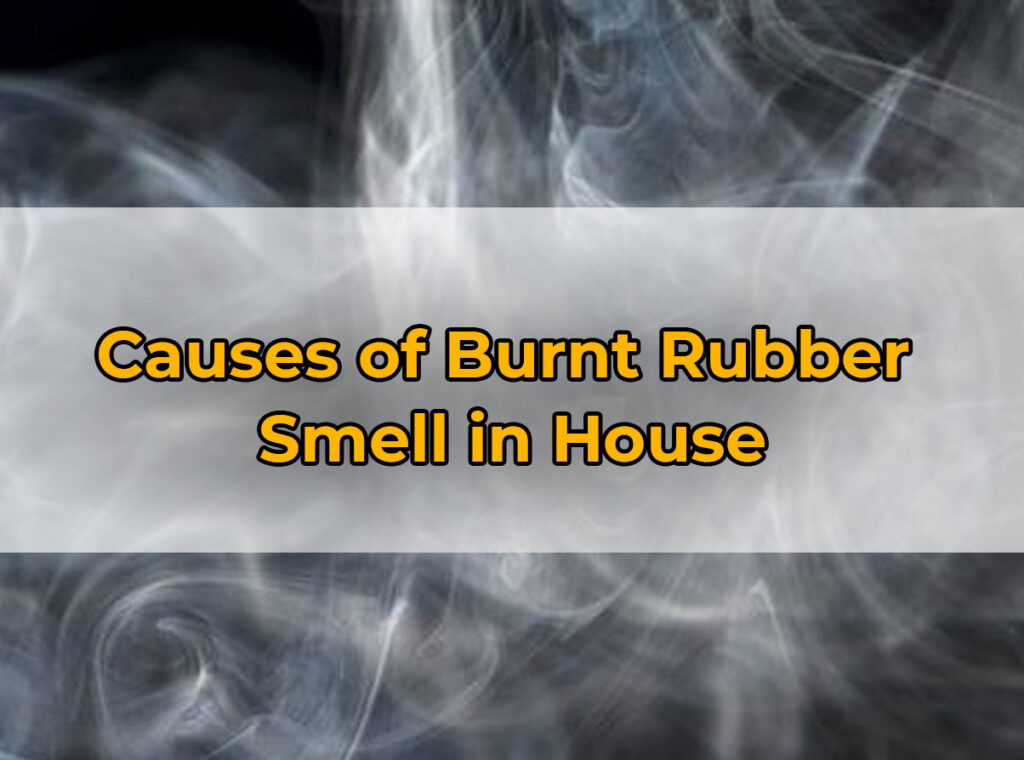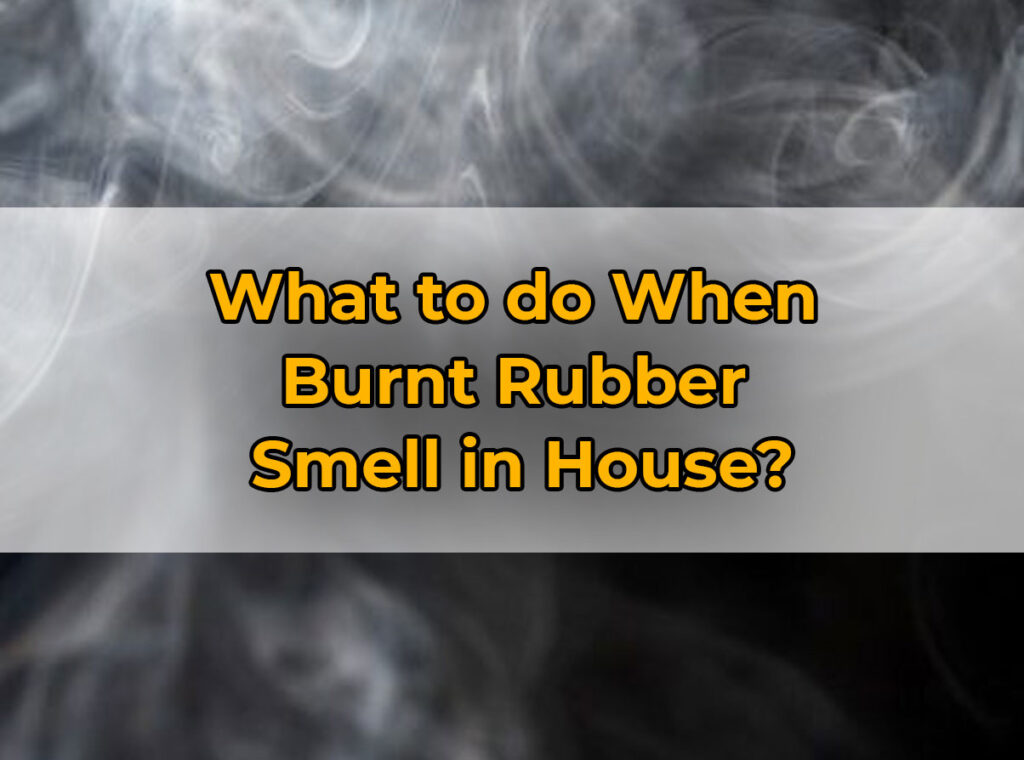A burnt rubber smell in house can be a real bummer. It creates an unpleasant atmosphere and raises safety concerns. This article aims to provide helpful insights into the causes of this odor, its potential effects, and ways to get rid of it.
To handle this issue, you need to find the source quickly. Check all electrical appliances and wiring for signs of damage or overheating. If you spot any, consult an electrician at once.
If burning tires are the cause, open windows and use fans to get rid of the burnt rubber smell in house and improve air quality. If the smell lingers, contact local authorities.
Inhaling toxic fumes from burning rubber can cause respiratory issues and harm your health.
Is Burnt Rubber Smell in House Dangerous?

The strong, pungent odor of burnt rubber can quickly fill a house, leaving homeowners concerned about potential health risks.
While the smell itself may be unpleasant and linger for hours, it is important to understand whether or not it poses any dangers.
In most cases, a burnt rubber smell in the house is not dangerous and can be attributed to common sources such as overheated appliances or burning debris.
One possible cause of a burnt rubber smell in the house is an electrical issue. Overheating wires or faulty electrical connections can emit this distinctive odor.
If you notice this burnt rubber smell in house, it’s essential to immediately investigate the source and address any electrical problems promptly. Another common culprit for a burnt rubber smell is an overheated appliance such as a vacuum cleaner or hairdryer.
Causes of Burnt Rubber Smell in House

burnt rubber smell in house? It can have various causes. Electrical issues? Faulty wiring or overheating of components can create that burning odor.
Here are some causes of burnt rubber smell in house:
1. Electrical Issue
Electrical issues have been identified as one of the leading causes of a burnt rubber smell in houses. When electrical wiring or components malfunction, they can produce a strong odor that resembles burnt rubber.
This distinct smell is often indicative of overheating wires or insulation, which can pose a serious fire hazard if left unaddressed.
One common electrical issue that can cause this smell is faulty wiring. Over time, electrical wires may become worn out or damaged, leading to overheating and potentially melting the surrounding insulation.
As the insulation burns, it releases a pungent aroma similar to that of burning rubber. Additionally, loose connections within electrical outlets or switches can create resistance and generate heat, resulting in a burning odor.
Another potential cause could be an overloaded circuit. Plugging too many appliances or devices into a single circuit can overwhelm its capacity and cause excessive heat buildup.
2. HVAC System Problem
If you’ve been noticing a strong burnt rubber smell in your house, it could be a sign of an HVAC system problem.
One common culprit could be a worn-out or damaged fan belt in your HVAC system. When the belt becomes loose or frayed, it can produce a burning rubber smell as it rubs against other components. In such cases, getting the belt replaced by a professional technician should resolve the issue.
Another potential cause of the burnt rubber smell is an overheating motor in your HVAC system. The motor can overheat due to various reasons, such as lack of lubrication or faulty wiring. As the motor heats up beyond its normal operating temperature, it may emit a distinct odor resembling burnt rubber.
3. Malfunctioning Appliances
Malfunctioning appliances can be a major culprit behind the unpleasant burnt rubber smell that permeates your house. This distinct odor can not only be annoying but also worrisome, as it indicates potential hazards within your home.
One common appliance known to emit this smell is the electric motor of a dryer or washing machine. If these machines are not properly maintained or have faulty components, they can overheat and produce the distinctive scent of burning rubber.
Another appliance notorious for causing a burnt rubber smell is the dishwasher. The heating element in dishwashers is responsible for drying dishes and cutlery effectively.
However, if this component malfunctions or comes into contact with plastic utensils or other foreign objects, it may produce a noxious odor reminiscent of burning rubber. It is crucial to regularly inspect and maintain all appliances to prevent such issues from occurring.
4. Plumbing Issue
One common cause is a faulty water heater. Over time, sediment and minerals can accumulate in the tank, causing the heating element to overheat and emit a distinct odor similar to burning rubber.
In some cases, this issue may only occur when hot water is being used or when the water heater has been turned on for an extended period.
Another potential source of the burnt rubber smell could be a problem with your plumbing vents. These vents are responsible for allowing air to escape from your drains, preventing any build-up of gas or odor in your home’s sewage system.
When these vents become clogged or blocked, gases can get trapped and create an unpleasant smell resembling burnt rubber throughout your house.
5. External Factors
One possible external factor contributing to the burnt rubber smell in your house could be nearby industrial activities.
Industries that involve rubber manufacturing or processing often release fumes and odors into the air, which can easily infiltrate nearby residential areas.
If you live close to factories or industrial zones, these emissions could be making their way into your home and causing the unpleasant smell.
Another potential external factor could be road construction or repairs happening near your residence.
What to do When Burnt Rubber Smell in House?

Say goodbye to the burnt rubber smell in house! Here are some steps you can take to troubleshoot this:
1. Identifying the Source of the Smell
To pinpoint the source of a burnt rubber smell in your house, use a systematic approach. Here are key steps to help you find the culprit:
- Examine electrical appliances and cords for damage or overheating. Faulty wiring can cause a burnt rubber smell.
- Check your HVAC system, air vents, and filters. A malfunctioning motor or burnt-out belt can create odors.
- Look for signs of burning or melting rubber materials like floor mats, tires, and insulation.
- See if any recent repairs or renovations used rubber-based materials. Adhesives or heating tools could make a burnt rubber scent.
- Consider if any activities with high friction were done nearby. Friction can cause rubber to overheat and emit an odor.
- Contact a professional inspector who specializes in smells.
2. Address immediate safety concerns
Addressing immediate safety concerns is crucial when encountering a burnt rubber smell in your house.
The first step is to identify the source of the odor. Check all electrical appliances and cords for any signs of damage or overheating, as this could be a potential fire hazard.
Unplug any suspicious devices and refrain from using them until they have been inspected by a professional. Make sure you install fire sprinkler system to prevent any bad scenarios.
Next, ensure that there are no visible flames or smoke coming from anywhere in the house. If you notice any, evacuate immediately and contact emergency services. Safety should always be your top priority in such situations.
3. Ventilate the area
Once you have addressed these immediate safety concerns, it is advisable to ventilate the area by opening windows and turning on fans to dissipate the smell.
This will also help eliminate any potentially harmful gases or fumes that may have been released along with the burnt rubber odor. It can also work for garbage disposal smells and oven smells like gas when preheating.
4. Disconnect or turn off suspected appliances
This will prevent further damage or potential hazards while you investigate the source of the odor. Appliances such as hairdryers, vacuum cleaners, or even electronic devices could be responsible for emitting the unpleasant smell.
By disconnecting them from power sources, you eliminate the possibility of an electrical fire and allow for a safer environment.
Once you have disconnected all potentially problematic appliances, proceed with identifying the source of the burnt rubber smell. Check your electrical outlets and cords for signs of melting or charring.
Damaged wires can produce a distinct odor that resembles burning rubber, indicating an electrical malfunction that requires immediate attention from a professional electrician.
5. Contact a professional
An expert will have the necessary knowledge and experience to handle such situations effectively.
When faced with a burnt rubber smell in your home, it’s best not to attempt DIY fixes without professional guidance. Trying to locate the source on your own may expose you to harmful chemicals or dangerous electrical components. I
nstead, seek out an experienced technician who can conduct a thorough inspection of your house’s wiring, appliances, and ventilation system. They will be able to pinpoint any faulty equipment or potential causes of the smell.
Remember that safety should always be prioritized when dealing with unusual odors in your home.
6. Monitor for signs of danger
If you see smoke or notice flames, evacuate your home immediately and call emergency services.
If you’re unable to determine the exact source or if the smell persists even after unplugging appliances, it’s crucial to ensure that your home’s smoke detectors are working properly.
While investigating, pay attention to any additional symptoms that may indicate a more serious issue.
To prevent the smell from happening again, look for signs of damage or overheating in electrical appliances. Follow these steps and you’ll soon be enjoying a pleasant-smelling home!
Preventing future occurrences of the Burnt Smell
To avoid burnt rubber smell in house, follow these steps:
- Check electrical appliances: Make sure they don’t overheat and inspect them for signs of malfunction or wear.
- Clean ventilation: Dust, debris, and mold can cause smells. Clean or have it professionally inspected.
- Dispose of waste properly: Don’t leave hazardous materials or chemicals around. They can smell bad when heated or exposed to air.
- Look for leaks: Leaks can lead to water damage and mold, which can cause bad smells. Regularly inspect and repair leaks.
- Keep the house clean: Regularly clean and disinfect surfaces, floors, and carpets to prevent odor buildup.
Remember, prevention is key! By following these steps, you can reduce the risk of burnt rubber smells.
And be aware that some new rubber materials can naturally smell a bit. This usually goes away as they age and become less volatile.
Conclusion
The odd burnt rubber smell in your home can be confusing. After inspecting, it’s obvious that this odour is not to be taken lightly. Possible sources, such as electrical faults and overheating machines, have been looked at. But, there are other elements to think about.
It is possible a hidden rubber item is melting or burning slowly. This could be a forgotten rubber mat under furniture, or an old rubber seal in the ventilation system. These tiny things can give off a strong scent when heated for a long time.
Furthermore, certain household items and products have artificial rubber compounds. When these materials become too hot or catch fire, they can emit a distinctive burnt rubber smell. Having a look around for any materials like this may help to find the source.
Also, The National Institute of Standards and Technology (NIST) reported that burning rubber produces toxic gases, such as sulfur dioxide and carbon monoxide. These gases can harm people and the environment. Identifying and handling the source of the smell is therefore very important.
How long does burnt rubber smell last?
In most cases, if a small amount of rubber is burnt in a well-ventilated area, the smell may dissipate within a few hours or a day. However, if a large quantity of rubber is burned or if it occurs in an enclosed space with poor ventilation, the smell can persist for several days or even weeks. The strong and stubborn nature of this odor makes it difficult to eliminate completely without proper measures.
Can inhaling burnt rubber make you sick?
The main concern lies in the release of toxic chemicals when rubber is burned. These chemicals include benzene, carbon monoxide, and styrene, among others. Inhaling these substances can irritate the lungs and respiratory system, leading to symptoms such as coughing, wheezing, shortness of breath, and chest tightness.
How do you neutralize burnt rubber smell?
One effective method to neutralize burnt rubber smell is by using vinegar. Its acidic properties help break down the compounds responsible for the foul odor.
Simply mix equal parts white vinegar and water in a spray bottle and generously spray the affected area. Let it sit for a few minutes before wiping clean with a cloth or sponge. The vinegar will not only eliminate the smell but also leave behind a fresh scent.
“There is no real ending. It’s just the place where you stop the story.”






